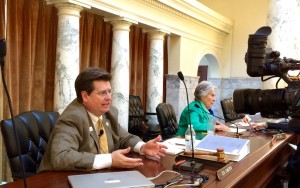As the veteran co-chairman of the Joint Finance-Appropriations Committee, Sen. Dean Cameron wielded his influence over every agency budget in the state — including the largest budget of them all, the K-12 budget.
But now, Cameron is leaving the Legislature in the middle of his 13th two-year term; on Friday, Gov. Butch Otter tapped the Rupert Republican to head the state’s Department of Insurance.

Before considering the political dominoes, let’s first put Cameron’s budgeting role into perspective.
Cameron didn’t budget in a vacuum. In a news release Friday, Cameron praised the House’s longtime JFAC co-chair, Rep. Maxine Bell, R-Jerome — no surprise, considering the two had worked together to run the Legislature’s most powerful committee for more than a decade. And the two chairpersons didn’t solo on the K-12 budgets. This session, much of the budget-writing fell to Rep. Wendy Horman, R-Idaho Falls, a first-year JFAC member who had served as a Bonneville School District trustee before she was elected to the Legislature.
But as chairman, Cameron had a strong hand in the Legislature’s power shift on high school broadband. Cameron was openly skeptical of the Idaho Education Network broadband project — and when the project’s controversial contract was voided in district court, Cameron advocated for a change in course. The result: JFAC and the Legislature shifted the broadband project away from the state Department of Administration and into the hands of the State Department of Education, establishing a program to reimburse school districts for local Internet contracts.
That isn’t to say there was always a smooth relationship between Cameron the budget-writer and leaders of the Legislature’s policy-making committees. In 2013, the Senate took the unusual step of voting down a K-12 budget — because lawmakers felt that the budget’s “intent language” usurped the role of the Senate Education Committee. In 2015, JFAC delayed writing the K-12 budget to allow the House and Senate education committees to sort out compromise language on a career ladder to boost teacher pay.
Now, to the dominoes:
Who replaces Cameron as JFAC co-chairman? That decision won’t be made until closer to the 2016 session, Senate President Pro Tem Brent Hill told the Associated Press Friday. Next in line would be vice chairwoman Sen. Shawn Keough, R-Sandpoint, a 10-term lawmaker who also sat on Senate Education in 2015. Like Cameron, Keough is considered a moderate. Senate Education Chairman Dean Mortimer, R-Idaho Falls, and Vice Chairman Steven Thayn, R-Emmett, also sit on JFAC, although Keough outranks them on the budget committee.
A broadband committee vacancy. While certainly not as high-profile as the JFAC co-chairmanship, Cameron’s departure also leaves a vacancy on a legislative interim committee to study the broadband issue. In the final moments of the 2015 session, lawmakers created the committee to complete “a thorough and complete study” of broadband for schools and state agencies.
Who completes Cameron’s Senate term? The Magic Valley’s legislative District 27 has featured one of the state’s most stable and influential delegations: Cameron; House Speaker Scott Bedke, R-Oakley; and five-term Rep. Fred Wood, R-Burley. It will be up to Cassia and Minidoka county Republicans to submit three nominations to Otter, who will name a successor from that list. A sidenote: After the 2012 redistricting put the two Republicans on a collision course, 15-term Sen. Denton Darrington of Declo opted to step down rather than run in a primary against Cameron, a friend and longtime colleague.
